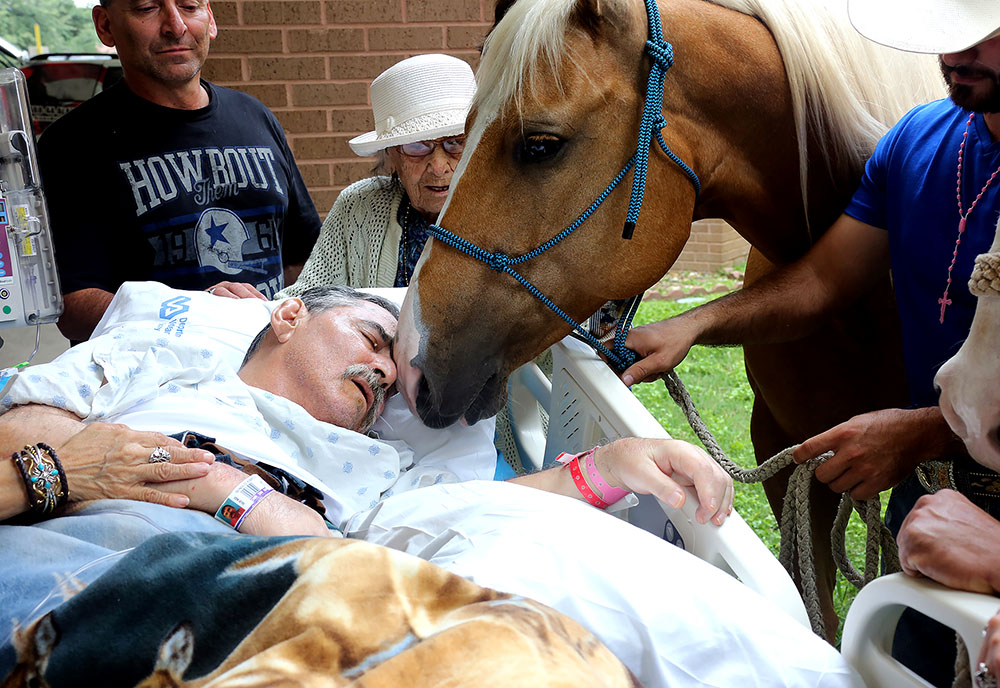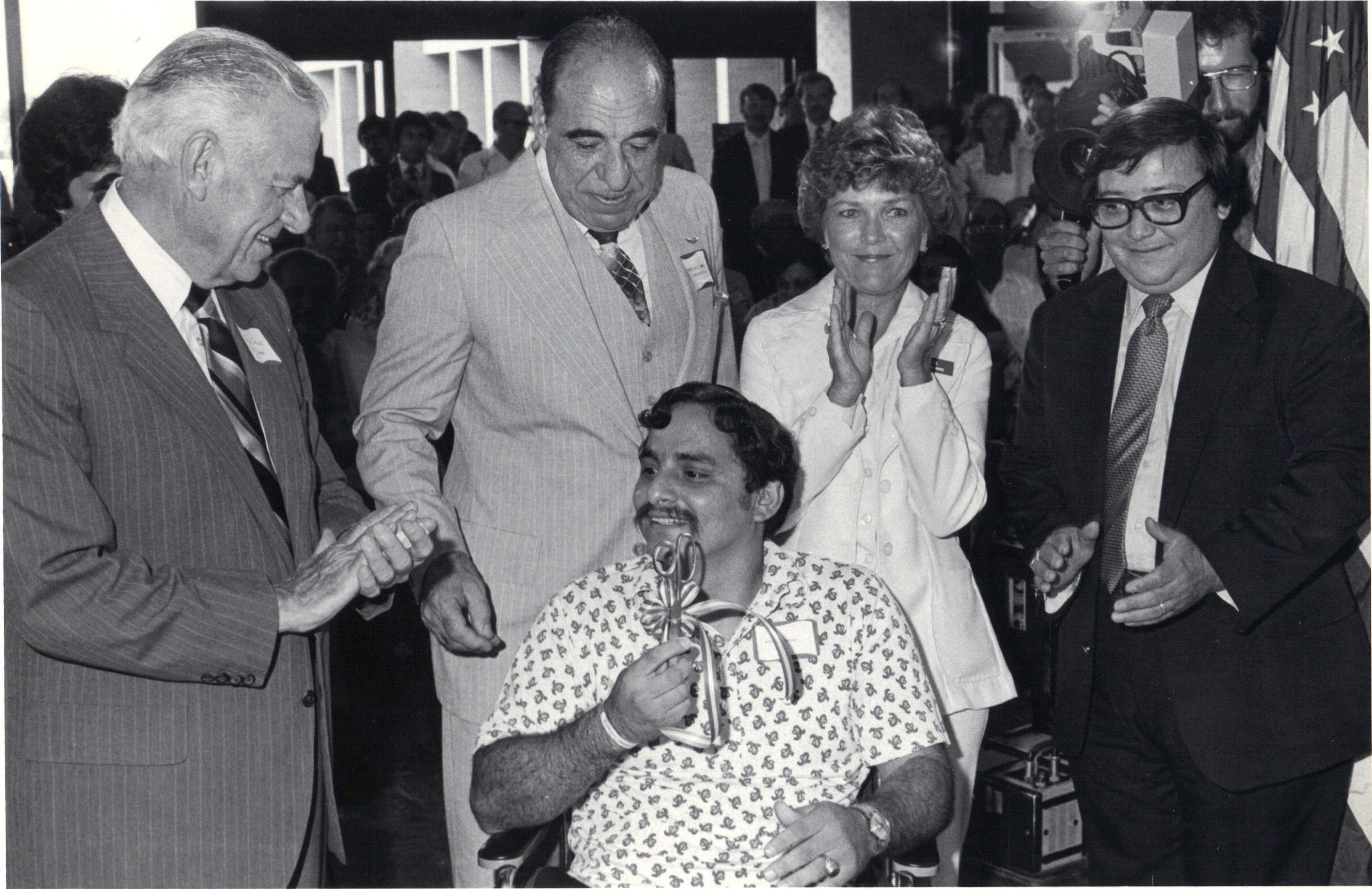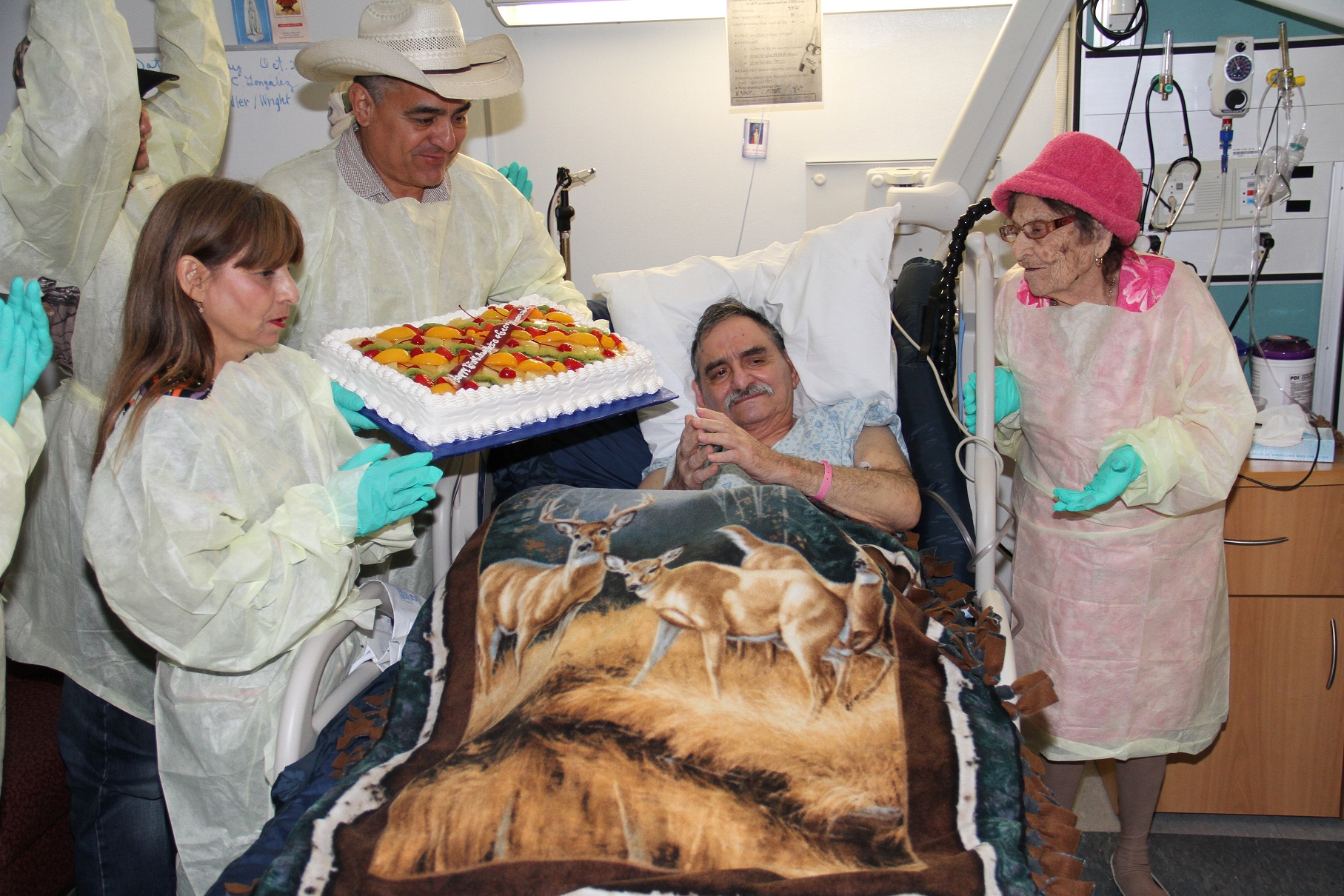Veterans Health Administration
Dying Veteran Emotional Last Request

Dying Veteran’s Emotional Last Request And the VA Team that made it happen
Like many other young men in the late 1960s, Roberto Gonzalez answered when Uncle Sam called. He was drafted by the Army for service in June of 1969, a week after finishing school. Gonzalez, from South Texas, found himself going to Army basic training instead of working on the family ranch and going to summer graduation parties.
Gonzalez was a member of the 25th Infantry, and on one mission, was selected to be on point during a patrol. What he didn’t know was they were walking into an ambush of North Vietnamese soldiers lying in wait. They sprung up from a trench, firing on the 14-man squad. With Gonzalez on point, he took the brunt of fire, being hit three times: through both lungs, a bullet hitting and shattering his leg below the knee, and the last striking his abdomen, fragmenting and hitting his spine, creating the shrapnel that led to his paralysis.
He described his wounds with much less bravado and even a little sense of humor. “I had three shots with an AK-47 and had a thousand little ones,” Gonzalez said. “I had holes all over my body, but I made it,” he said, grinning while describing the horrendous attack.
The fighting was so intense, they transported him a few miles away to a landing zone (LZ) to be medevac’d. Although the chopper was finally cleared to land, Gonzalez wasn’t in the clear yet. “Every time the chopper lifted off, my blood pressure dropped rapidly,” Gonzalez explained. He said they did this numerous times before they flew him out of the hot zone.
Out of his original 14-man squad, Gonzalez was one of only three that had survived. The fellow soldiers he left behind left an imprint on his memory, even 45 years after he returned home, making his face sullen as he described the experience. “I saw a lot of bad things over there,” he murmured. “I saw a lot of dead people.”
One of the first patients at Audie Murphy Hospital
Gonzalez finally came back to the U.S. in 1970, spending the remainder of the year rehabilitating until he could be safely moved. Along the way, he made stops at hospitals in Saigon and Japan, befpre ending up in Memphis, Tenn. at a specialized VA hospital for paraplegics. He rehabilitated for 18 months until he finally got back to Premont, Tex.
“I had holes all over my body, but I made it.”
He needed continuous care, and the only availability was a hospital in Houston and returns to Memphis for his specialty care. All of that changed when Gonzalez could be seen at the newly-established Audie L. Murphy Memorial Veterans Hospital that was dedicated in November 1973. The new hospital was more convenient for him and he became one of its very first patients.

Gonzalez cuts the ribbon to the new elevated walkway connecting the Audie Murphy hospital with the UT Health Science Center in 1980. He was one of the first patients at hospital after it was dedicated in November of 1973. (Photo courtesy of San Antonio Express News)
It’s one of the things that led to former hospital director, Jose’ Coronado to nominate Gonzalez and his new wife, Rosario, to cut the ribbon on the new walking bridge between the Veterans hospital and the University of Texas Health Research Center in 1980.
Besides being hospitalized in 1975 for kidney issues, Rosario said Gonzalez was rather healthy, working the 20,000 acre ranch near Premont that has been in the family since the late 1800’s.
When Gonzalez fell ill again in 2015, they transported him to a hospital in Corpus Christi, but were delighted the stay was temporary, and that they would be returning to Audie Murphy. “There are some really good nurses in this ward,” Rosario said of the spinal cord unit.
Gonzalez added that he wouldn’t want to go anywhere else. Rosario thinks the specialized training the spinal cord staff receives makes the difference. 
In the fall of 2015, Roberto Gonzalez's large family came from near and far to celebrate his birthday. (Photo by Steve Goetsch)
In the fall of 2015, after a couple months at Audie, the Gonzalez family held a special birthday party for Gonzalez and his younger brother George, who shares the same birthday. They brought enough food and drink to supply a small army because they included the staff and inpatients on the ward they consider part of their family. “We’ve met so many great families from guys that have been hurt with spinal cord injuries,” Rosario said.
Rosario herself was a fixture on the ward, staying nearby at the South Texas VA Fisher House by the campus. His mother, Elodia, who might have been responsible for her son’s resiliency, came up frequently, despite being three hours from the hospital. “His mom is 92 years old,” Rosario exclaimed. “She is a feisty lady, and she is something else.”
Does resilience come with spending four decades in a wheelchair, refusing to give up, or is it bolstered by the 10 supportive siblings that help with the ranch and who drove from all over south Texas in inclement weather to celebrate their brothers’ birthdays? Whatever the case may be, one of the things that kept Gonzalez going were his horses.
Despite becoming fixtures at the hospital, and lauding the care they received there, there was only one place Gonzalez wanted to be…back on the ranch, with his horses.
His face lit up when he talked about them. From traveling through several states to show and sell racehorses, to the short-legged cows he raised and attempted to describe to a naïve city slicker. He missed his ranch and getting into his “big truck” every morning and doing what he did for decades, with his father and grandfather by his side.
The Gonzalez family was holding down the ranch, awaiting his return. “They keep us informed,” Rosario said, speaking of the many nieces and nephews that stepped up in Gonzalez’s absence.
This most recent visit to Audie was taking a toll on Gonzalez. He was tired. It was a different Gonzalez than Rosario was used to. “He was very independent, it’s just recently that his body has worn down,” Rosario said. “He used to transfer on his own; he just started needing help.”
Gonzalez experienced some complications and began losing his battle. He had liver problems, and his kidneys began to shut down. The time came when the staff began to prepare the family. If Gonzalez couldn’t get to the ranch, the Gonzalez family wanted to bring the ranch to him. There were two horses that were favorites of Gonzalez: Sugar and Ringo, but bringing them into a hospital would take some planning.
Dr. Seth Chandler, chief of Audie’s Spinal Cord Injury (SCI) unit, with Nurse Manager Louis Nwojo and their team, consulted with the family and worked out the logistics. With safety being paramount, the decision to facilitate the visit was granted. Nwojo said the team did a safety check of all medical devices, and brought the bed out to the parking lot and the two waiting equine friends to say goodbye.
Surrounded by Rosario and his family, the horses gently greeted Gonzalez in a quiet, somber gathering. He passed away May 23, just two days later. Gonzalez leaves quite a legacy; Vietnam Veteran, Silver and Bronze Star and Purple Heart recipient, faithful husband of 40 years, the only Texas paraplegic horse trainer, Veteran of the Month and patriarch of one of the biggest, most supportive families you could ever meet…Roberto Gonzalez was not a casualty of war.
Rest in peace, Roberto, and thank you for your service.
(Author’s note: This story is based on interviews conducted with Roberto in the fall of 2015.)



















